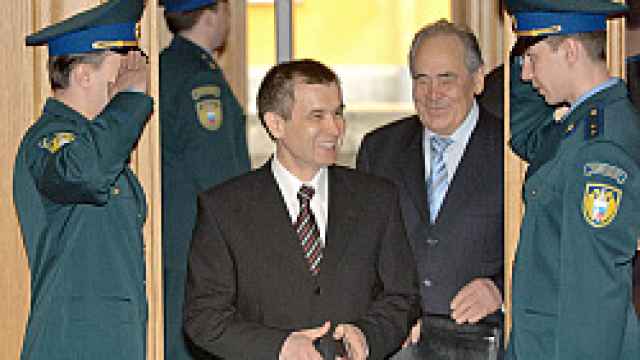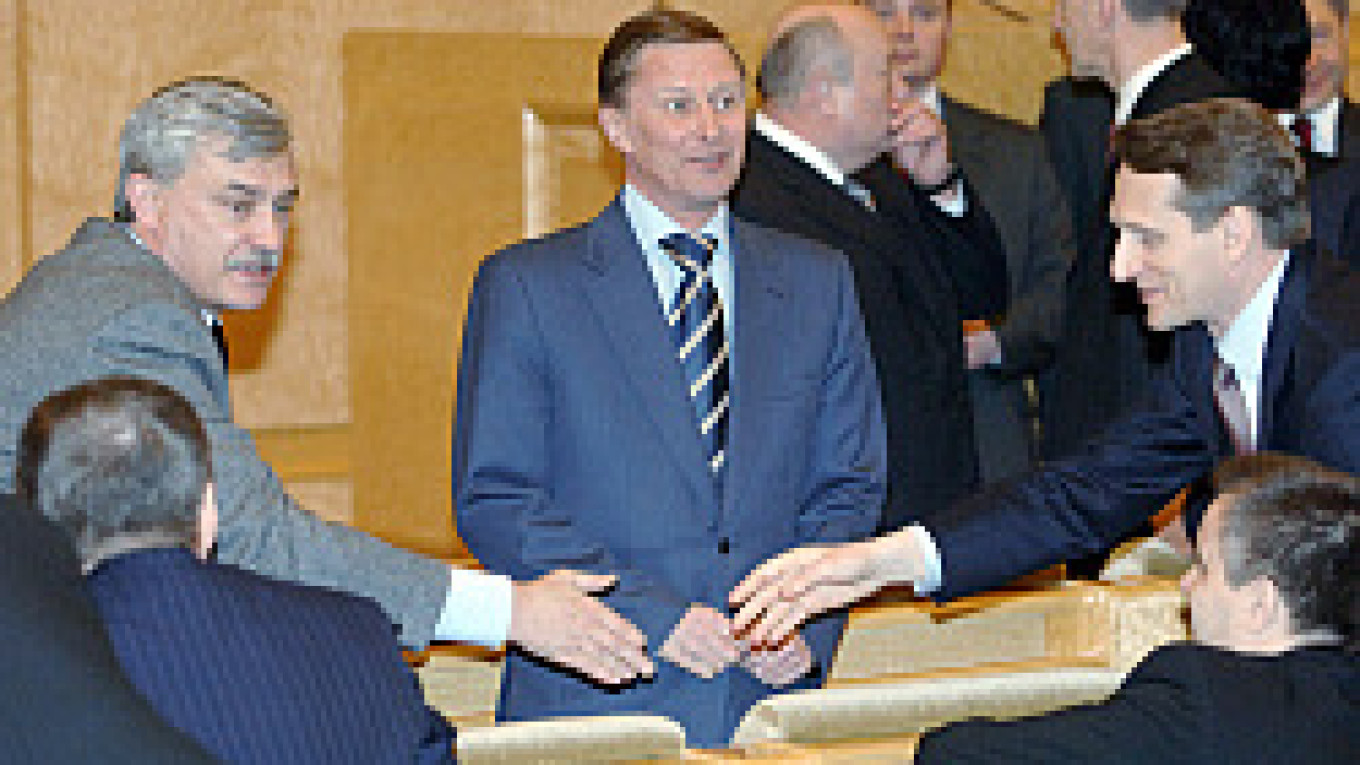President Vladimir Putin on Wednesday called for smarter defense spending in a world where "Comrade Wolf knows whom to eat" -- apparently referring to the United States' aggressive stance in global affairs.
Putin, in his state-of-the-nation address, said he envied the amount of money that the United States could plow into defense but offered assurances that Russia could maintain military parity at a much lower cost if it achieves "intellectual superiority."
Russia's military budget amounts to only 4 percent of that of the United States, he said.
"This is what defense professionals call 'their home is their castle.' And good for them! Good for them!" Putin said.
He then said Russia should also build "a strong, reliable home because we do see what's going on in the world."
"Comrade Wolf knows whom to eat. It's eating without listening to anyone. And by all appearances, it's not going to listen," Putin said, prompting the audience to burst into applause.
"Where is all this pathos about the need to fight for human rights and democracy when it comes to the need to pursue their own interests?" Putin asked. "Here everything is possible. There are no limits."
By using the wolf allegory and mentioning democracy, Putin appeared to taking a jab at the White House. U.S. President George W. Bush and Vice President Dick Cheney accused Russia last week of not always sticking to democratic values.
Putin emphasized that Russia should upgrade its military but not repeat the mistakes of the Soviet Union, which sacrificed its economy and social spending to an arms race with the United States.
The path to reliable security lies through "intellectual superiority" that would allow the armed forces to increase the efficiency of the nuclear triad at a lower cost, Putin said.
In the next five years, Russia plans to upgrade its fleet of nuclear submarines and long-range planes as well as land-based intercontinental ballistic missiles, Putin said. It will also continue to develop new high-precision weapons that will be difficult to intercept, he said.
He said Russia would soon commission two nuclear submarines equipped with the new Bulava intercontinental ballistic missiles, noting that the submarines would be the first to be constructed since Soviet times.
The military must not only defend the country from terrorism and possible attacks from abroad, but also help resist political pressure from nations that seek to become stronger at Russia's expense, Putin said. "I must say this directly: The stronger our armed forces are, the less temptation there will be to exert such pressure on us, whatever reasons are used to apply it," Putin said.
However, Putin had earlier in the speech called for an end to the arms race and urged disarmament, an issue that, he said, had moved to the back burner in the face of terrorism. There are still no guarantees that weapons, including nuclear weapons, will not be deployed in outer space, and there is a risk that small nuclear bombs will be built, he said. On top of that, experts and the media have been discussing plans of tipping ICBMs with conventional warheads, Putin said. The launch of such a missile could provoke a nuclear power to deliver a nuclear counterstrike, he said.
On Iran, Putin said that Russia was unequivocally in favor of nonproliferation, but warned that use of force was rarely successful and could cause consequences that would be more dangerous than the initial threat.
Putin reiterated that two-thirds of the army would be enlisted men instead of conscripts by 2008, which would allow the state to slash the length of mandatory service from two years to one. About 600 rapid-response units will begin operating by 2011, he said. "We need armed forces that are able to simultaneously carry out battles in global, regional and, if need be, several local conflicts."
The military should be able to guarantee Russia's security and territorial integrity, he said, referring to the fight with militants in the North Caucasus.
He said the threat of terrorism remained significant, especially in ethnic and religious conflicts. "I know that someone would very much like Russia to get bogged down in these problems and, as a result, be unable to solve a single one of its problems of comprehensive development," he said without identifying the foe.
Reforms have improved the armed forces from what they were in 1999, when militants crossed into Dagestan from Chechnya and began hostilities, Putin said. The army then needed at least 65,000 troops to beat back the attack, but it had only 55,000 who were battle-ready, he said. "So we had to send rookie boys to battle. I will never forget that," he said. "And the goal for you and me is to make it never happen again."
In his remarks, Putin left listeners with the clear impression that he would like to spend as much on defense as the United States, said Ivan Safranchuk, a Moscow analyst with the Center for Defense Information, a Washington-based think tank. "Russia wants to be another wolf," he said.
The wolf reference was a response to the "United States, its actions in Iraq and plans toward Iran, its games on the territory of the CIS and its criticism of Russia," Alexei Makarkin, an analyst at the Center of Political Technologies, a think tank, said on Ekho Moskvy radio.
Putin's goal of intellectual superiority is realistic because Russian weapon designers and engineers were on par with their U.S. counterparts, Safranchuk said. But Russia lags behind the United States in strategic military decision-making, including a call on what weapons it needs to develop and deploy, he said.
Yabloko leader Grigory Yavlinsky criticized the speech in a statement, calling it the announcement of a policy of "a fortress country, a distrust toward partners and a superiority over neighbors."
Gleb Pavlovsky, a Kremlin consultant, said Putin had signaled his reluctance to get Russia involved in armed conflict. "The goal is to stay out of trouble, especially military trouble, that is introduced into the world by the United States," he said, Interfax reported. "The address says it directly: Dragging us into a Cold War will not be possible."
Putin, in his state-of-the-nation address, said he envied the amount of money that the United States could plow into defense but offered assurances that Russia could maintain military parity at a much lower cost if it achieves "intellectual superiority."
Russia's military budget amounts to only 4 percent of that of the United States, he said.
"This is what defense professionals call 'their home is their castle.' And good for them! Good for them!" Putin said.
He then said Russia should also build "a strong, reliable home because we do see what's going on in the world."
"Comrade Wolf knows whom to eat. It's eating without listening to anyone. And by all appearances, it's not going to listen," Putin said, prompting the audience to burst into applause.
"Where is all this pathos about the need to fight for human rights and democracy when it comes to the need to pursue their own interests?" Putin asked. "Here everything is possible. There are no limits."
By using the wolf allegory and mentioning democracy, Putin appeared to taking a jab at the White House. U.S. President George W. Bush and Vice President Dick Cheney accused Russia last week of not always sticking to democratic values.
Putin emphasized that Russia should upgrade its military but not repeat the mistakes of the Soviet Union, which sacrificed its economy and social spending to an arms race with the United States.
The path to reliable security lies through "intellectual superiority" that would allow the armed forces to increase the efficiency of the nuclear triad at a lower cost, Putin said.
In the next five years, Russia plans to upgrade its fleet of nuclear submarines and long-range planes as well as land-based intercontinental ballistic missiles, Putin said. It will also continue to develop new high-precision weapons that will be difficult to intercept, he said.
He said Russia would soon commission two nuclear submarines equipped with the new Bulava intercontinental ballistic missiles, noting that the submarines would be the first to be constructed since Soviet times.
The military must not only defend the country from terrorism and possible attacks from abroad, but also help resist political pressure from nations that seek to become stronger at Russia's expense, Putin said. "I must say this directly: The stronger our armed forces are, the less temptation there will be to exert such pressure on us, whatever reasons are used to apply it," Putin said.
However, Putin had earlier in the speech called for an end to the arms race and urged disarmament, an issue that, he said, had moved to the back burner in the face of terrorism. There are still no guarantees that weapons, including nuclear weapons, will not be deployed in outer space, and there is a risk that small nuclear bombs will be built, he said. On top of that, experts and the media have been discussing plans of tipping ICBMs with conventional warheads, Putin said. The launch of such a missile could provoke a nuclear power to deliver a nuclear counterstrike, he said.
On Iran, Putin said that Russia was unequivocally in favor of nonproliferation, but warned that use of force was rarely successful and could cause consequences that would be more dangerous than the initial threat.
Putin reiterated that two-thirds of the army would be enlisted men instead of conscripts by 2008, which would allow the state to slash the length of mandatory service from two years to one. About 600 rapid-response units will begin operating by 2011, he said. "We need armed forces that are able to simultaneously carry out battles in global, regional and, if need be, several local conflicts."
The military should be able to guarantee Russia's security and territorial integrity, he said, referring to the fight with militants in the North Caucasus.
 Grigory Sysoyev / Itar-Tass Interior Minister Rashid Nurgaliyev and Tatarstan's Mintimir Shaimiyev arrive. | |
Reforms have improved the armed forces from what they were in 1999, when militants crossed into Dagestan from Chechnya and began hostilities, Putin said. The army then needed at least 65,000 troops to beat back the attack, but it had only 55,000 who were battle-ready, he said. "So we had to send rookie boys to battle. I will never forget that," he said. "And the goal for you and me is to make it never happen again."
In his remarks, Putin left listeners with the clear impression that he would like to spend as much on defense as the United States, said Ivan Safranchuk, a Moscow analyst with the Center for Defense Information, a Washington-based think tank. "Russia wants to be another wolf," he said.
The wolf reference was a response to the "United States, its actions in Iraq and plans toward Iran, its games on the territory of the CIS and its criticism of Russia," Alexei Makarkin, an analyst at the Center of Political Technologies, a think tank, said on Ekho Moskvy radio.
Putin's goal of intellectual superiority is realistic because Russian weapon designers and engineers were on par with their U.S. counterparts, Safranchuk said. But Russia lags behind the United States in strategic military decision-making, including a call on what weapons it needs to develop and deploy, he said.
Yabloko leader Grigory Yavlinsky criticized the speech in a statement, calling it the announcement of a policy of "a fortress country, a distrust toward partners and a superiority over neighbors."
Gleb Pavlovsky, a Kremlin consultant, said Putin had signaled his reluctance to get Russia involved in armed conflict. "The goal is to stay out of trouble, especially military trouble, that is introduced into the world by the United States," he said, Interfax reported. "The address says it directly: Dragging us into a Cold War will not be possible."


